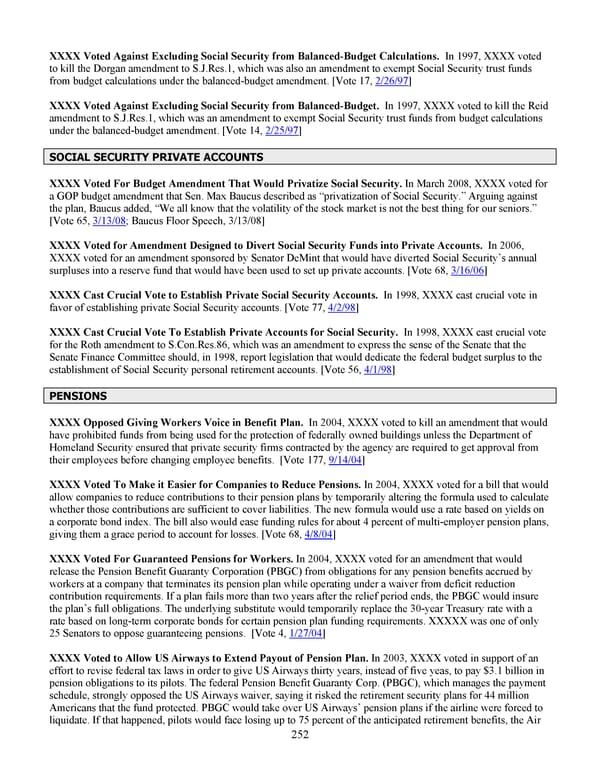XXXX Voted Against Excluding Social Security from Balanced-Budget Calculations. In 1997, XXXX voted to kill the Dorgan amendment to S.J.Res.1, which was also an amendment to exempt Social Security trust funds from budget calculations under the balanced-budget amendment. [Vote 17, 2/26/97] XXXX Voted Against Excluding Social Security from Balanced-Budget. In 1997, XXXX voted to kill the Reid amendment to S.J.Res.1, which was an amendment to exempt Social Security trust funds from budget calculations under the balanced-budget amendment. [Vote 14, 2/25/97] SOCIAL SECURITY PRIVATE ACCOUNTS XXXX Voted For Budget Amendment That Would Privatize Social Security. In March 2008, XXXX voted for a GOP budget amendment that Sen. Max Baucus described as “privatization of Social Security.” Arguing against the plan, Baucus added, “We all know that the volatility of the stock market is not the best thing for our seniors.” [Vote 65, 3/13/08; Baucus Floor Speech, 3/13/08] XXXX Voted for Amendment Designed to Divert Social Security Funds into Private Accounts. In 2006, XXXX voted for an amendment sponsored by Senator DeMint that would have diverted Social Security’s annual surpluses into a reserve fund that would have been used to set up private accounts. [Vote 68, 3/16/06] XXXX Cast Crucial Vote to Establish Private Social Security Accounts. In 1998, XXXX cast crucial vote in favor of establishing private Social Security accounts. [Vote 77, 4/2/98] XXXX Cast Crucial Vote To Establish Private Accounts for Social Security. In 1998, XXXX cast crucial vote for the Roth amendment to S.Con.Res.86, which was an amendment to express the sense of the Senate that the Senate Finance Committee should, in 1998, report legislation that would dedicate the federal budget surplus to the establishment of Social Security personal retirement accounts. [Vote 56, 4/1/98] PENSIONS XXXX Opposed Giving Workers Voice in Benefit Plan. In 2004, XXXX voted to kill an amendment that would have prohibited funds from being used for the protection of federally owned buildings unless the Department of Homeland Security ensured that private security firms contracted by the agency are required to get approval from their employees before changing employee benefits. [Vote 177, 9/14/04] XXXX Voted To Make it Easier for Companies to Reduce Pensions. In 2004, XXXX voted for a bill that would allow companies to reduce contributions to their pension plans by temporarily altering the formula used to calculate whether those contributions are sufficient to cover liabilities. The new formula would use a rate based on yields on a corporate bond index. The bill also would ease funding rules for about 4 percent of multi-employer pension plans, giving them a grace period to account for losses. [Vote 68, 4/8/04] XXXX Voted For Guaranteed Pensions for Workers. In 2004, XXXX voted for an amendment that would release the Pension Benefit Guaranty Corporation (PBGC) from obligations for any pension benefits accrued by workers at a company that terminates its pension plan while operating under a waiver from deficit reduction contribution requirements. If a plan fails more than two years after the relief period ends, the PBGC would insure the plan’s full obligations. The underlying substitute would temporarily replace the 30-year Treasury rate with a rate based on long-term corporate bonds for certain pension plan funding requirements. XXXXX was one of only 25 Senators to oppose guaranteeing pensions. [Vote 4, 1/27/04] XXXX Voted to Allow US Airways to Extend Payout of Pension Plan. In 2003, XXXX voted in support of an effort to revise federal tax laws in order to give US Airways thirty years, instead of five yeas, to pay $3.1 billion in pension obligations to its pilots. The federal Pension Benefit Guaranty Corp. (PBGC), which manages the payment schedule, strongly opposed the US Airways waiver, saying it risked the retirement security plans for 44 million Americans that the fund protected. PBGC would take over US Airways’ pension plans if the airline were forced to liquidate. If that happened, pilots would face losing up to 75 percent of the anticipated retirement benefits, the Air 252
 HRC vote skeleton Page 271 Page 273
HRC vote skeleton Page 271 Page 273